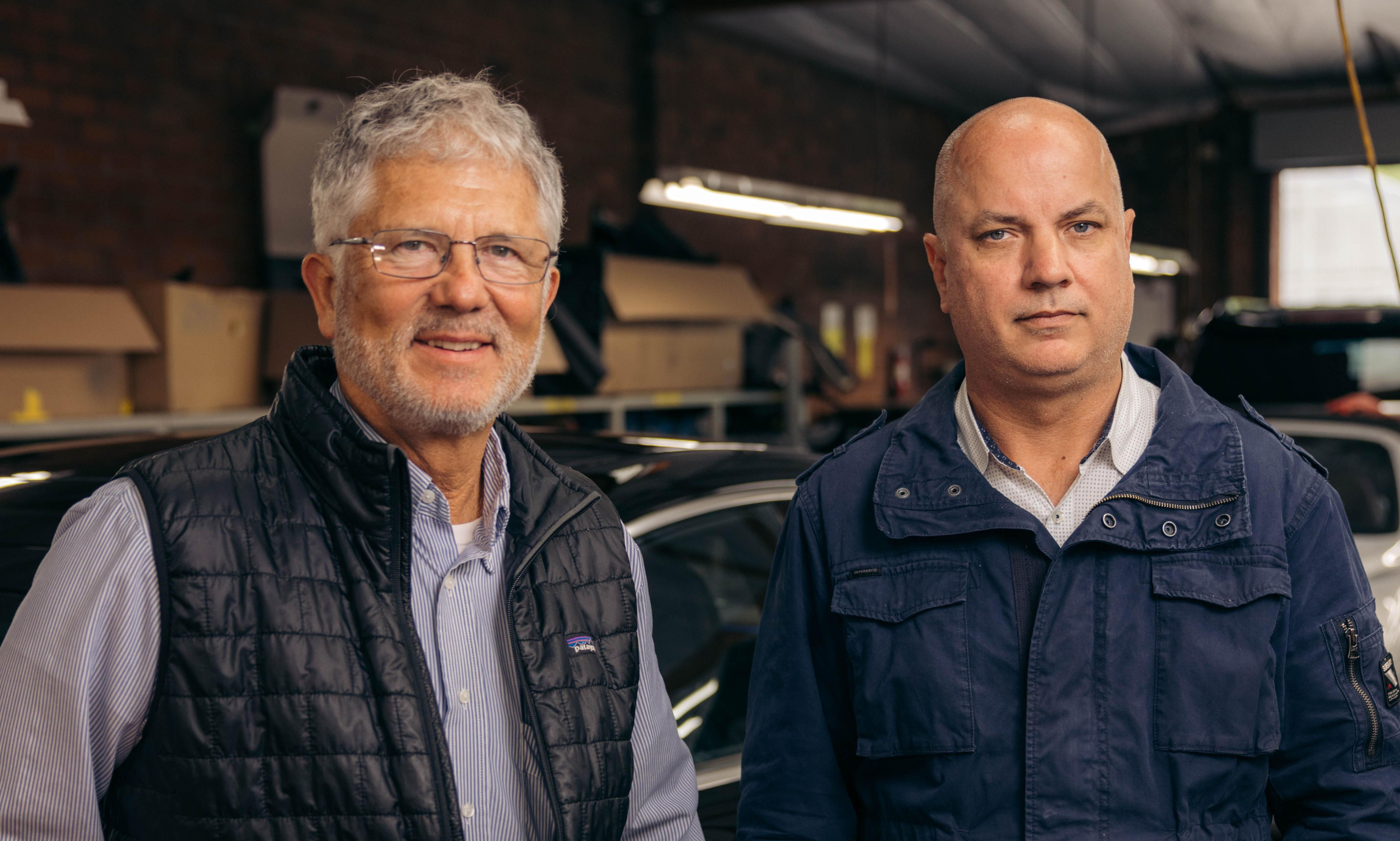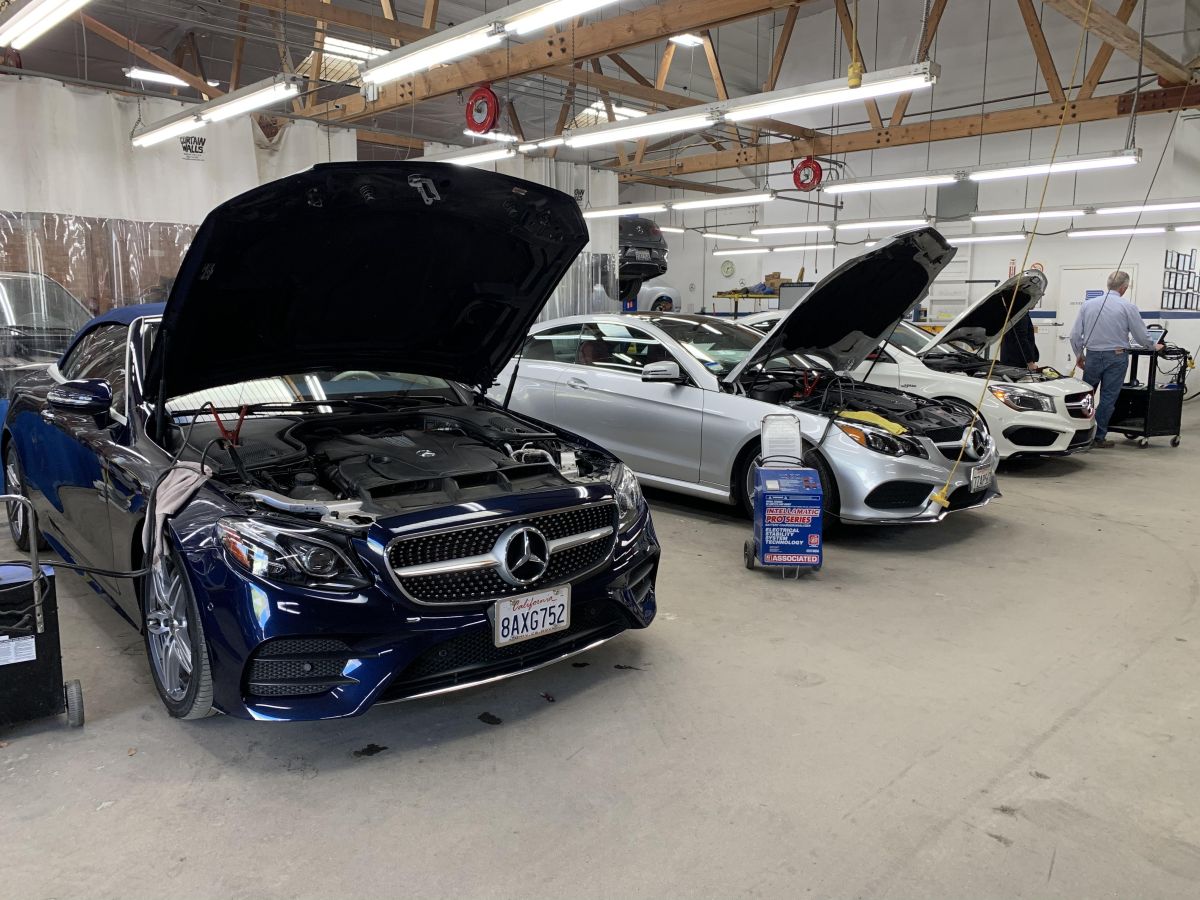Beverly Coachcraft in Los Angeles, CA, was founded in 1979 with an emphasis on Mercedes-Benz collision repair. It was one of the first shops in the U.S. to become a certified collision repair facility, and later, one of the first to achieve “Elite” status, the highest level within Mercedes-Benz’s certification program.
It’s now co-owned by Bryan Thompson, also president and CEO, who appeared on an episode of The Collision Vision podcast, driven by Autobody News and hosted by Cole Strandberg, as part of its “Evolution of OEM Certifications” series.
Thompson discussed how to get OEM certified, how to build dealership sponsorships and, most importantly, how to turn those certifications into business growth.
Thompson got his start in the industry in his father’s shop in North County San Diego as a detailer, polisher and helper for both mechanical and body repairs. “Kind of an all-around guy,” he said.
Later, after earning a degree in molecular biology at the University of Southern California, Thompson went back to collision repair, taking a job with Caliber Collision.
“Notorious hirer of folks with degrees in molecular biology,” Strandberg laughed.
Thompson was running a high-end shop in Los Angeles when Peter Sardi, who founded Beverly Coachcraft, was ready to retire. Thompson bought him out and now co-owns the business with Dan Schmipke.
Thompson said the shop stands out for its “relentless pursuit of collision repair quality,” as well as “the ability to relentlessly execute on the same quality repair again and again and again. I think that's what sets us apart.”
 Beverly Coachcraft co-owners Dan Schimpke, left, and Bryan Thompson, right.
Beverly Coachcraft co-owners Dan Schimpke, left, and Bryan Thompson, right.
The customers Beverly Coachcraft attracts are “very savvy customers who are hyper focused on their assets and the value of their assets,” Thompson said. “They view a certified repair as the only option, and they want to either keep their lease contract intact or want to maintain the value of their asset to the highest level. We deliver on repair quality. It's car by car. It's not reputation. It's what we deliver over the curb. Every project, every time, every day.”
Thompson said his shop’s work volume has increased by adding certifications.
“We're able to drive sales through the door and increase our volume and increase the quality of projects and claims that we work on,” he said.
He said insurance carriers are “still learning to digest our business model. I wouldn't say it's something that they recognize or are willing to just accept.”
Dealership Sponsors for OEM Certifications
Currently, it’s a “tough environment” for dealerships that provide the sponsorships that premium OEMs require for certified collision repair shops, Thompson said. “It's highly competitive,” he added.
Thompson said some shops, after getting a sponsorship, will “hoard all the mechanical labor. They're ineffective at billing body labor. And the shop will be profitable, but the dealer will not see much effect.”
Once he has a relationship with a dealership, Thompson said he tries to “move the needle” immediately, by only using new OEM parts — no aftermarket or used — that he orders from the dealership.
“We believe in a reciprocal relationship with the dealers, where if you take care of us, we take care of you,” he said. “We do everything in our power to flood their parts and service department with revenue and make our business second to none with our competitors with regards to parts and service sales.
“We make an effort to impact the [dealership’s] profit and loss statement…so that they see us,” he said.
It’s also important to have a consistent physical presence at the dealership, Thompson said.
“The one thing I preach in our organization is relentless consistency,” he said. “If it's going to be Friday lunch, it's every Friday lunch. If I have to drive an hour and a half to drop off Danishes every Friday morning, I'm there every Friday morning, no matter how I feel. So that relentless consistency, I think, is one of the key components of our success.”
Thompson said it’s not about the Danish, but rather “it’s all about the relationships you build, getting to know people, what they value.”
Beverly Coachcraft will often offer to fix lot damage for free. “Stop listening to what I have to say. Let's show what we can do,” Thompson said.
Any shop owner trying to transition from a DRP to an OEM certification model should “expect a lot of rejection” if pursuing certifications that require sponsorships, Thompson said.
“If you're new to this business and you're a DRP model, start to pick off one OEM at a time and try and transition that relationship,” he advised. “Because the DRP model is completely one sided, it benefits one side. So you need to pursue a win-win. The OEM certification gives you leverage to come to the table to pursue a win-win strategy instead of being trapped in a win-lose.”
Choosing the Right OEM Certifications to Pursue
Beverly Coachcraft is certified by Mercedes-Benz, BMW, Tesla, Lexus, Nissan/Infiniti and Porsche.
Thompson said shop owners should “have an ear to the ground in the market and make sure that there's room for you in the market.”
“It may be a dealer has a preferred provider, and they're looking for you to only add value but not refer any work,” he said. “So you have to be pretty savvy. You have to work the market and know what's going on in the market. You don't want to get trapped and spend money on certifications and get three cars a month.”
Thompson said in his market, he is looking for vehicles that require special tools, equipment, parts and training, which he can leverage to charge a higher labor rate.
“We're in a brutal market. The rent is very high. The labor is expensive here,” he said. “I have to maximize every dollar.”
Marketing Your Shop’s OEM Certifications
Beverly Coachcraft markets its OEM certifications by being active in the local community.
“We do a lot of Cars and Coffee. I'm a car enthusiast. We do events specific to brands’ club events. I'm involved with the PCA [Porsche Club of America]. I’m involved with a motorcycle club,” Thompson said. “Just showing up and supporting our dealer events. Our Porsche dealer does the Cars and Coffee every quarter. I'm there.”
Beverly Coachcraft also hosts golf events for dealership service writers, insurance partners, vendors and its employees.
OEM Certifications as a Hiring Tool
OEM certifications mean Beverly Coachcraft is “able to bill more, so we're able to pay more. So I'm able to attract top talent and keep them,” Thompson said. “It's a competitive market for technicians. You need top talent to execute the repairs.”
The shop pays an hourly rate plus a commission based on productivity, “so everyone rows at the same pace, because everyone's got a large financial gain if they work together.”
Beverly Coachcraft has a program to help less experienced technicians progress by training under a lead technician.
“I was that B or C tech at one point in my life,” Thompson said. “I take great pride in helping young men achieve their goals of becoming A techs and getting their life going and making enough money to support their families.”
Thompson said the shop pulls OEM service engineering documents for every job to ensure it is repaired correctly, and documents the process with lots of photos.
“Every car gets a couple hundred photos. We photograph every step,” he said. “It's full transparency.”
Supervisors also do weekly spot checks and grades technicians on how they’re repairing a car relative to the OEM service engineering documents.
“We hold people accountable. It has nothing to do with individual talent. We actually prefer that people operate from humility and follow the instructions the manufacturer provides,” Thompson said.
It’s quickly apparent if an employee isn’t going to fit into that culture, he added.
Evolving Vehicle Tech’s Effect on OEM Certifications
Thompson said he bought in early to advancements like aluminum and electric powertrains, and it has proven lucrative.
“I think people who fight that technology, they're going to be in for a tough day,” he said.
OEMs are looking at collision repair as a “bigger percent of aftersales,” Thompson said. “They're hyper focused on collision.”
Thompson said it’s a misconception that OEM certifications are too expensive to generate an ROI.
“Anyone who's stuck in 1988 is going to come up with a million different reasons to not get involved,” he said. “But the era of making 60% [gross profit], fixing cars with 10 tools is over.”
He predicted collision repair will “end up in a world of large MSOs that cater to insurance companies’ needs and certified collision repair facilities where people who care about their assets have their cars repaired. So you either need to get on board with the new technology and evolve or sell to an MSO.”














Abby Andrews